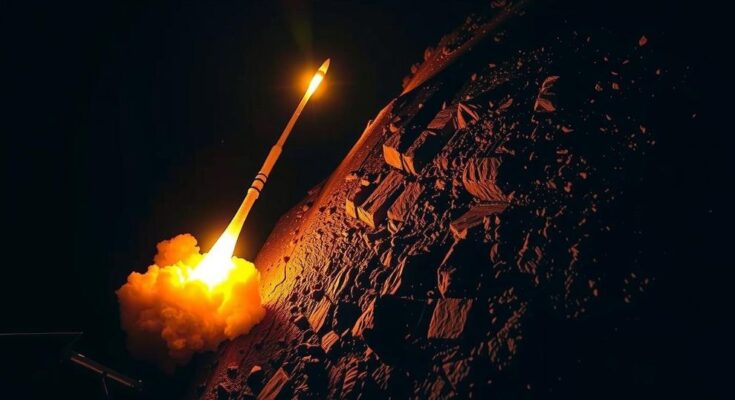Recent rocket attacks from Lebanon have killed seven people in northern Israel, marking a significant escalation in hostilities as Israeli airstrikes target Hezbollah sites in Syria. The violence follows a recent offensive by Hamas, prompting U.S. diplomats to seek cease-fires in the conflict. Hezbollah’s leadership asserts the group’s preparedness for a prolonged struggle against Israel, complicating peace efforts amidst high casualty rates and humanitarian crises in Lebanon and Israel.
In a severe escalation of hostilities, laser-guided rocket fire from Lebanon has claimed the lives of at least seven individuals in northern Israel, marking the deadliest assault of its kind since Israel initiated its military operations earlier this month. The attacks targeted two locations, coinciding with the presence of senior U.S. diplomats in the region who are advocating for cease-fires in Lebanon and Gaza. This diplomatic push aims to de-escalate the ongoing conflicts between Israel and Iranian-backed factions in the Middle East as the Biden administration’s tenure draws to a close. The Hezbollah militant organization has been relentless in its daily assaults on Israel, employing rockets, drones, and missiles, which in retaliation have drawn an Israeli military response since the onset of hostilities following Hamas’s terrorist offensive on October 7, 2023, from Gaza. Both Hezbollah and Hamas share ideological links and are recognized as Iranian proxy groups, classified as terrorist organizations by the U.S., Israel, and several other nations. On the same day of the rocket attacks in Israel, the Israel Defense Forces (IDF) conducted airstrikes targeting sites near Qusair in western Syria, alleging that Hezbollah had recently begun to stockpile arms there for smuggling purposes into Lebanon. These airstrikes were part of a broader strategy by the IDF to disrupt the operations of Hezbollah, particularly targeting border crossings between Lebanon and Syria that are suspected of facilitating arms transfers. The conflict has escalated dramatically since the IDF’s preemptive strikes across Lebanon last month, resulting in the assassination of Hezbollah’s senior leadership, including their commander Hassan Nasrallah. The resultant ground incursions have caused significant casualties, reporting nearly two dozen Israeli military fatalities while Lebanon’s health authorities estimate approximately 2,000 lives lost due to the airstrikes. The Metula regional council reported the fatalities resulting from Thursday’s attack, which included several foreign workers, although their nationalities remain undisclosed. Metula, located at the northernmost point of Israel, has been particularly hard hit, with substantial damage reported and most residents having evacuated. In a press statement, Hezbollah’s newly appointed chief Sheikh Naim Qassem proclaimed that the group would persist in its military efforts until accepted terms for a cease-fire were presented, asserting the organization’s readiness for a prolonged conflict. He stated, “Hezbollah’s capabilities are still available and compatible with a long war.” Amidst these developments, Israeli military officials urged residents in southern Lebanon to flee due to ongoing airstrikes, which reportedly claimed eight lives earlier that day, according to Lebanon’s National News Agency. The Lebanese government indicates that over 2,800 individuals have died and nearly 13,000 have sustained injuries since the conflict commenced more than a year ago, creating significant humanitarian challenges as approximately 1.2 million have been displaced. In Israel, the toll from Hezbollah’s attacks has been severe, with at least 68 fatalities, including a substantial number of soldiers, while over 60,000 Israelis along the northern border have faced prolonged evacuations. As efforts for mediation continue, no signs of compromise have emerged from either side amid the ongoing violence. Senior U.S. officials, including Brett McGurk and Amos Hochstein, returned to Israel to engage in discussions regarding potential cease-fire agreements and the release of hostages, respectively, stressing the importance placed on regional stability.
The ongoing conflict between Israel and Iranian-backed groups has intensified against a backdrop of longstanding geopolitical tensions in the Middle East. Following Hamas’s attack on Israel from Gaza on October 7, 2023, Israel has responded with significant military actions against both Hamas and Hezbollah in Lebanon. The conflict illustrates the complicated dynamics involving Iran as a key supporter of these groups, often referred to as proxies, posing direct threats to Israel’s security. The continued hostilities have incurred substantial casualties on both sides and have led to significant humanitarian crises, highlighting the urgent need for international diplomatic efforts to stabilize the region.
The situation in northern Israel remains dire as hostilities between Israeli forces and Iranian-backed groups in Lebanon and Gaza escalate. Recent rocket attacks have resulted in significant casualties, while Israeli airstrikes in Syria target perceived threats from Hezbollah. As diplomatic initiatives progress, a resolution remains elusive, with both sides entrenched in their positions. Without effective mediation and trust-building measures, the prospect for peace continues to diminish amid rising tensions.
Original Source: www.cbsnews.com




